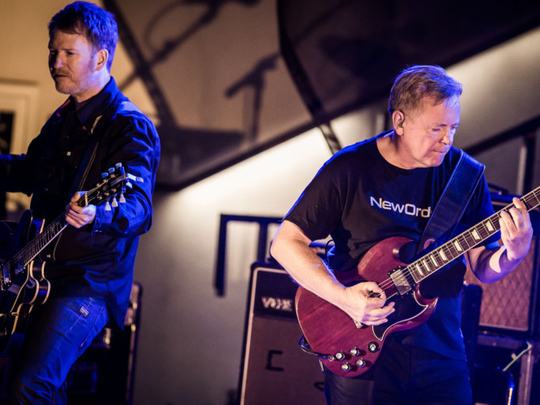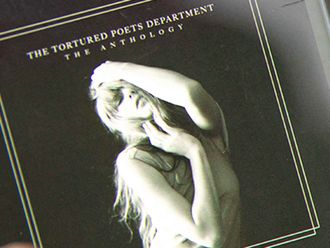
New Order looked on the point of irreversible rupture not long ago, but now one of the definitive forces in alternative rock is back with a new album and different “DNA”.
Founding bassist Peter Hook left in 2006, a year after New Order’s previous studio release, and declared the band finished.
But a decade later, New Order — born 35 years ago from the ashes of Joy Division — has returned and the remaining band members say they feel a sense of relief.
“The DNA of the band has changed, right, but it’s still New Order — but it’s a happier New Order,” frontman Bernard Sumner said.
The happiness does not necessarily reflect on the sound of Music Complete, which comes out on Friday and retains the sombre undertone that made New Order’s electronic music so identifiable.
But the bad blood is gone.
Since quitting the band, Hook has toured widely and — in marked contrast to the bassist’s old bandmates — frequently plays songs from Joy Division, which released two seminal albums of bleak post-punk before singer Ian Curtis committed suicide in 1980.
After Hook left, Sumner and Phil Cunningham, a guitarist who joined the band after its maturity, formed a new act called Bad Lieutenant.
But New Order returned with a global tour in 2012, playing major festivals, and Sumner said that the musicians have grown accustomed to playing without Hook.
“At the end of the day, it’s a bass guitar. I can play bass guitar,” Sumner said.
The album is the first new studio material since 2005’s Waiting for the Sirens’ Call, although New Order in 2013 released a final album with Hook, Lost Sirens, taken from previous recording sessions.
After several years of touring, “the next obvious thing to do was to make a record to renew the vitality of the band ... to keep a living identity rather than be a dinosaur,” said Sumner, who turns 60 in January.
“If you go out and just play the old stuff and never write new stuff, you’re not really a complete musician, you’re a performer,” he said.
Return to keyboard sound
Stephen Morris, the historic drummer from Joy Division and New Order, and guitarist Cunningham return for Music Complete.
But the album is the first in nearly 15 years with Gillian Gilbert, a keyboardist who joined New Order soon after Curtis’ suicide and is credited with helping Sumner shift the band’s post-punk style to electronic music. She first returned for New Order’s live performances.
“Initially, to be honest, we knew we were a great live band but we didn’t know what the chemistry would be like in the studio. It took a while but, when we were locked in, it was great,” Cunningham said.
Even without Hook, the album maintains the distinctively dominant, minor-key bass on tracks such as Singularity and Academic, with danceable synthesised lines interspersed with guitar.
The album goes more fully in a dance or even disco direction on songs such as Tutti Frutti.
With a few exceptions, such as on Nothing But a Fool, the album emphasises keyboards rather than the guitar that was more notable on New Order’s early albums as well as Waiting for the Sirens’ Call and Republic from 1993.
“New Order has always been a hybrid band. We always mixed guitar, bass, drums with electronic,” Sumner said.
“I guess on this album, the tendency was to use more electronic instruments. In the previous one, the tendency was to be more rocky with more guitars,” he said.
Guest appearances
Music Complete features a guest appearance by US punk godfather Iggy Pop, who lends his gravely voice to the spoken-word “Stray Dog.”
Over the dark New Order beat, he recites: “I would rather be a lover than a liar/I would rather be a lover than a supplier.”
New Order also taps another venerable yet younger Manchester band, The Chemical Brothers, whose Tom Rowlands lends his beats.
Sumner has long known Rowlands “and his involvement was like having an extra member to the band, really”, Cunningham said. “He’s quite unique.”
The album also offers its share of social commentary such as on Restless, the first track and single, in which Sumner voices hope for a “nice car” and a girlfriend “who’s as pretty as a star”,
“It’s about commercialism and materialism, and how we have given that much importance to objects like an iPhone or iPad,” Sumner said.
“I just ask people to question themselves: Does it make us happier or is it just a distraction?”














